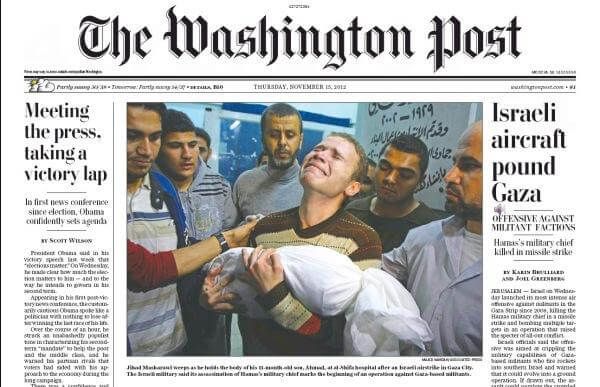Instead we are treated to images such as that of baby Omar Mishrawi on the front page of the Washington Post and other media outlets.
4. Moralizing over Israel’s interests
Newspaper reports have appeared alleging Israeli lobbying on behalf of the Egyptian military-backed government, including in the New York Times and Wall Street Journal. To the uninformed and those with a low opinion of Israel, this could imply support for the violent actions of the Egyptian army. With a healthy dose of cynicism, Shmuel Rosner responds in the NY Times: “Here we go again. Israel is rooting for another butcher” before spelling out the realities:
Israelis are not immune to being cold-hearted, cynical, hypocritical and racist. But this position is something else. If Israelis are rooting for Egypt’s military, it’s because they want a government next door that will respect the two countries’ peace treaty. And it’s because the military is the only institution in Egypt today that can prevent the Sinai Peninsula from becoming a safe haven for radicalism. Israelis are being pragmatic, and that might look ugly, but that’s what experience has taught them.
Indeed, Israel does not have the luxury of favoring liberal democratic forces over extremists, radicals or authoritarians. In a rough neighborhood you can only pick from the best of a bad bunch.
5. Journalists engaged in propaganda
The Egyptian Independent carries a feature on the polarization and abuse of Egyptian media:
Qutb al-Arabi, assistant secretary general of the Supreme Council of Journalism, said that he knows of some newspapers that refrained from publishing some writers’ articles for opposing their owners’ political affiliations, others banned media professionals from TV shows so as not to express the other point of view.
Jaqueline Zaher of DPA believes that the Egyptian media have become “vessels” for political powers.
“Authentication and double-checking news are not on the table for many of them. Rumors and half-leads were considered okay to publish or air,” she said. “This was either due to an avarice to publish more news to feed the audience that is always hungry for information, or, in most cases, to serve political agendas of the media owners.”
Al-Arabi also said that anonymous sources have run rampant in Egyptian media, making it easy for some newspapers to get away with inaccurate news.
Media outlets private and state-owned are steamrolling moderate, unpolarised opinions and news coverage leaving average Egyptians confused, while those affiliate to either side of Egypt’s political divide complain of media bias or resort to the end of the spectrum that confirms their bias and feed it even more, leaving little room for unbiased reports.
Egyptians are confused and the deep polarisation present in the street proves that few of them are empowered with the tools needed to weigh news before sharing them on social media or even adopting some of the media’s propaganda as personal opinions.
Perhaps Western journalists should stop viewing their Arab colleagues through the lens of Western journalistic practice. There have been plenty of occasions through the years where Palestinian journalists have taken an active role in the conflict beyond that of simply reporting.
Only in the past few weeks we exposed the agenda of Palestinian photojournalist Fadi Arouri who previously worked for Reuters while actively promoting a campaign against normalization of relations with Israel.
In May 2013, the Washington-based Newseum, a museum dedicated to the media, even considered including two Hamas activists who worked for the Hamas Al-Aqsa television network in a ceremony to honor those journalists who have been killed in the last year in the course of covering the news.
But as the Egyptian example as well as the activities of some Palestinian media has shown, simply putting down the word “journalist” as one’s profession doesn’t necessarily equal professionalism.



